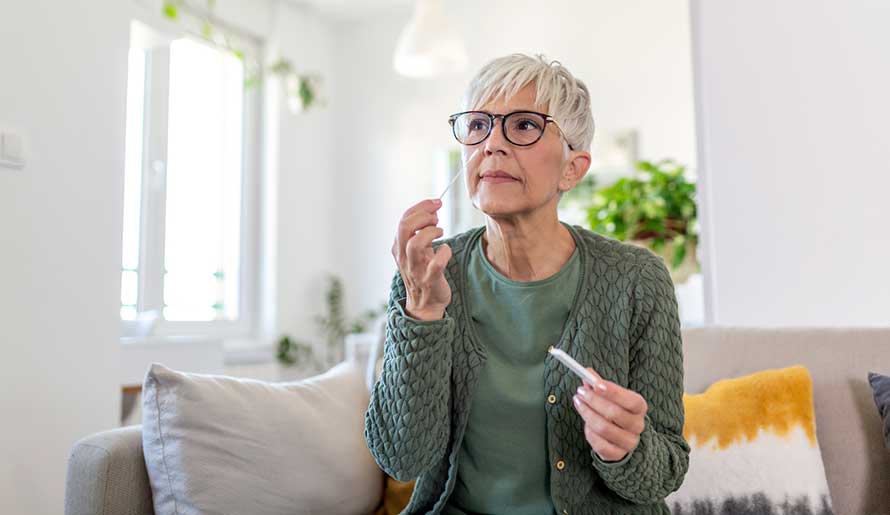Lung Cancer and COVID 19

Each year in November, Lung Cancer Awareness Month is observed across the United States. The goal is to cultivate a better public understanding of this common malignancy, which can be challenging to recognize because it often doesn’t produce symptoms until the tumor reaches an advanced stage.
The effects of the COVID-19 pandemic
As always, lung cancer awareness is the key to achieving the best possible outcome and quality of life. But this is especially true following the height of the COVID-19 pandemic when many people avoided or delayed medical care. The repercussions are now becoming apparent as more and more patients present for the first time with an advanced lung cancer diagnosis.
Preventing lung cancer and COVID-19
In addition to learning about the lung cancer risk factors—such as smoking and exposure to secondhand smoke—and taking steps to reduce or avoid them, everyone is encouraged to learn about lung cancer screening and find out if they might be eligible. What’s more, it is essential for lung cancer patients to be aware that they are highly vulnerable to infection with the SARS-CoV-2 virus, which causes COVID-19. For this reason, a COVID-19 vaccine and appropriate booster shots are particularly important for people with lung cancer, including those currently receiving chemotherapy and immunotherapy, and lung cancer survivors.
Why are lung patient patients more susceptible to COVID-19?
Scientists continue to study the underlying biology of SARS-CoV-2 infection in lung cancer patients, which is not yet well understood. Some experts attribute the heightened vulnerability to a lower antibody response to both SARS-CoV-2 infection and COVID-19 vaccines due to:
- A weakened immune system resulting from lung cancer or its treatment
- Frequent contact with the healthcare system
- Advanced age and coexisting medical conditions
Another factor that muddies the waters is that it can be difficult to distinguish between the symptoms of a lingering COVID infection and the symptoms of the underlying lung cancer. For instance, both conditions often cause persistent coughing and shortness of breath.
Lung cancer screening saves lives
Early detection via annual lung cancer screening with low-dose computed tomography (LDCT) is proven to save lives. In 2022, the U.S. Preventive Services Task Force broadened the guidelines for screening, which is now recommended for adults aged 50 (formerly 55) to 80 who have a 20 (formerly 30) pack-year smoking history and currently smoke or quit within the past 15 years.
Moffitt Cancer Center has developed a comprehensive lung cancer screening and surveillance program for people who are at high risk based on national guidelines. Widely recognized as one of the best in the nation, our program has been designated a Screening Center of Excellence by the Lung Cancer Alliance.
Talk with a specialist at Moffitt Cancer Center
For patients with lung cancer, the COVID-19 pandemic has underscored the importance of receiving multidisciplinary care. The team in Moffitt’s Thoracic Oncology Program has extensive experience in diagnosing and treating some of the more uncommon and complex lung malignancies, including mesothelioma and thymic carcinoma. We can provide a fast work-up and diagnosis as well as access to the most advanced treatment options available. For instance, we are proud to offer robotic bronchoscopy for difficult-to-reach lung nodules, and we have a robust portfolio of clinical trials using novel targeted drug and immunotherapy combinations.
If you would like to learn more about lung cancer screening and prevention, turn to the experts at Moffitt, where bold thinking and patient and family-centered care lead to superior outcomes (up to 4 times the national average). You can request an appointment with a lung cancer specialist by contacting us at 1-888-663-3488 or completing our new patient registration form online. You do not need a referral to meet with a member of our team. You can also learn more by reviewing our frequently asked questions about lung cancer.
References
American Lung Association – Lung Cancer Fact Sheet
American Lung Association – Lung Cancer and COVID-19 Update
Centers for Disease Control and Prevention – Lung Cancer Awareness
FAQs
- Signs and Symptoms
- Diagnosis
- Treatment
- FAQs
- Lung Cancer Early Detection Center
- Lung Cancer Screening and Surveillance Program
- Lung Nodules
- Lung Surveillance Clinic
- Metastatic Lung Cancer
- Recurrence
- Survival Rate
- Your Lung Cancer Specialists
- Lung and Thoracic Tumor Education (LATTE)
- Thoracic Clinic Updates
- Insurance & Financial Information
